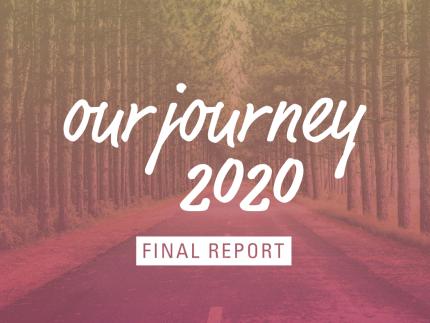Review of Our Journey 2020

Launched in the fall of 2016, the Christian Reformed Church in North America’s Our Journey 2020 ministry plan final report is now available for review.
Our Journey 2020 arose out of strategic listening sessions that were held in conjunction with many CRC congregations across the U.S. and Canada. From things learned in these sessions, the CRCNA focused the ministry plan into five areas in which they felt God was calling them to work through 2020.
The plan’s “desired futures” were identified as community engagement, discipleship, leadership, Reformed identity, and collaboration.
The final report offers a look at challenges faced and successes that took place across the denomination, its congregations, and its various ministries through the year 2020. It also provides some helpful lessons that can be applied to the new plan: Our Journey 2025.
Church and Community
- More than 40 congregations every quarter were involved in learning communities that designed experiments and developed plans and strategies to enhance ministry contextualization and renewal.
- 48 established churches participated in the starting of new churches, either as a partner or a parent church.
- 80 churches were added to the denomination (planted or coming in as an established church) during this four-year period, although some have since closed.
- Potential church planters were identified, assessed, and trained each year.
Discipleship
- Faith Formation Ministries (FFM) prioritized faith storytelling as a central component to healthy faith formation. They developed a faith storytelling toolkit, full of accessible resources for congregations, and they facilitated congregational and classis workshops related to storytelling.
- FFM facilitated a wide range of cohort experiences with teams from over 60 congregations participating. These emphasized the importance of intergenerational faith formation.
- From Dwell curriculum and Everyday Family Faith to numerous guides on children at the Lord’s Supper and intergenerational ministry, FFM placed a high value on developing children’s ministry opportunities and resources.
Identity
- The CRCNA’s denominational survey has affirmed year after year that local churches and members understand what it means to be “Reformed.”
- One of the successes has been the development of workshops at synod that provide room for pointed conversation and support for real ministry issues at the local level.
- A new system for congregations to be made aware of and to order materials for “special Sundays” was created.
- Another area of emphasis was development and execution of the Canadian National Gathering and the binational Inspire events in 2017 and 2019.
- Various resources and training opportunities were made available to congregations that are not yet or are emerging as multiethnic churches to further their journey toward greater diversity.
- Congregations identified and set goals to address local/national/global justice issues — discerning unique steps they could take to make an impact from their own communities.
- 50 additional congregations (663 total) now offer signing and/or aids for people with visual/hearing impairments.
- Congregations grew in awareness of the critical dynamic of the abuse of power, the key dynamic operating in situations of abuse, whether the abuse is emotional, physical, or sexual.
Leadership
- 100 percent of seminary students from CRC backgrounds were informed about the possibility of seeking financial support from their classis. Support exceeding $750,000 is provided to over 100 individuals each year.
- Increased emphasis was placed on programs to help develop and support leaders from nontraditional backgrounds into ordained ministry.
- Approximately one-half of candidates for ministry are now graduates of seminaries other than Calvin Theological Seminary who then participate in a CRC orientation program in the candidacy journey.
- Chaplaincy and Care Ministry continues to represent a vibrant stream of ministry. Over the past four years, a growing number of diverse chaplains have been supported and fully trained with Clinical Pastoral Education.
- Pastor Church Resources created a continuing education website for pastors.
- 77 regional pastors, including at least one in each classis, provide support to pastors and classes and report back to the CRCNA.
- A Spiritual Vitality Toolkit for pastors was created and has had more than 3,000 visits in English, 220 visits in Korean, and 75 visits in Spanish.
- An Evaluations Essentials Toolkit was created and sent to all churches to help them do an annual evaluation of their congregational leaders.
- A strong network of diaconal leaders exists that regularly brings together Diaconal Ministries Canada staff with nongovernment organizations in the U.S. that were once or still are diaconal conferences.
- Resonate Global Mission has been partnering with CRC congregations to form their own missional leaders and to engage them in the support of missional leader formation around the world.
- Raise Up Global Ministries equips global and North American leaders with inductive materials and training in how to lead inductively.
- 34 campus ministries are active on 40 campuses and are supported by 24 classes and 495 congregations. Over 1,600 students are reached by these ministries.
Collaboration
- The Connections Project started with help from a grant by Lilly Endowment Inc. This project focused on working with 12 classes for a three-year period. During 2019-2020, this pilot project was expanded through a second Lilly-funded initiative known as “Connections II.”
- A new Connections team was in place by March 1, 2020, and it has begun to do its work with all 49 classes.
- During the past four years, the church has demonstrated an increasing commitment to the health of classes as key for the health of local congregations.
- The denominational ministry offices formerly known as Specialized Ministries were renamed Congregational Services to reflect their posture of existing to serve local congregations.
- A One Click/One Call system was created, and customer service representatives were trained to provide one point of contact for anyone with a ministry question, and a quick way to find answers to those questions.
- The Digital Library was launched to provide all CRC members with free access to hundreds of Faith Alive titles.
- The ministry-share system was reimagined to provide greater ownership at the local church level. Instead of relying on a fixed, per-member amount set by synod each year, ministry shares will now rely on congregational pledges.
Lessons Learned from Our Journey 2020
- The plan needs to be owned and understood by local congregations as something that applies to them. It cannot simply be a tool to guide CRCNA ministry activities.
- To create such ownership, we need to allow churches to see the value of working in certain areas alongside other congregations that are doing the same things.
- There was confusion about how the five desired futures of Our Journey 2020 fit with or flowed from what is sometimes called the “five callings” of the CRCNA. The “five callings” are more clearly described as our five ministry priorities — the overarching components describing our Reformed identity. They are Faith Formation, Servant Leadership, Global Mission, Mercy and Justice, and Gospel Proclamation and Worship — and collectively they make up Our Calling.
- Our Journey 2020 sometimes felt irrelevant to CRCNA staff and was somewhat tangential to their everyday work.
- The reporting for Our Journey 2020 was complex and time consuming. It involved a lot of counts of various activities but didn’t provide much feedback about how these counts were affecting local congregations or our denomination as a whole.
The new ministry plan, Our Journey 2025, was approved in a special meeting of the Council of Delegates in June 2020 (in lieu of synod, which did not meet because of COVID-19 restrictions) and launched in January 2021.
Our Journey 2025 outlines four priorities for the next five years — namely, to become congregations and communities that engage in the following:
- Cultivate practices of prayer and spiritual discipline, transforming our lives and communities by the power of the Holy Spirit.
- Listen to the voices of every generation, shaping us for ministry together.
- Grow in diversity and unity by seeking justice, reconciliation, and welcome, sharing our faith as we build relationships with and honor the cultures of our neighbors and newcomers.
- Share the gospel, live it missionally, and plant new churches in our neighborhoods as we discover how to connect with our local and global ministry contexts.
More information about this plan will be coming to classis meetings throughout the next few months. You can also learn more at crcna.org/ourjourney.


